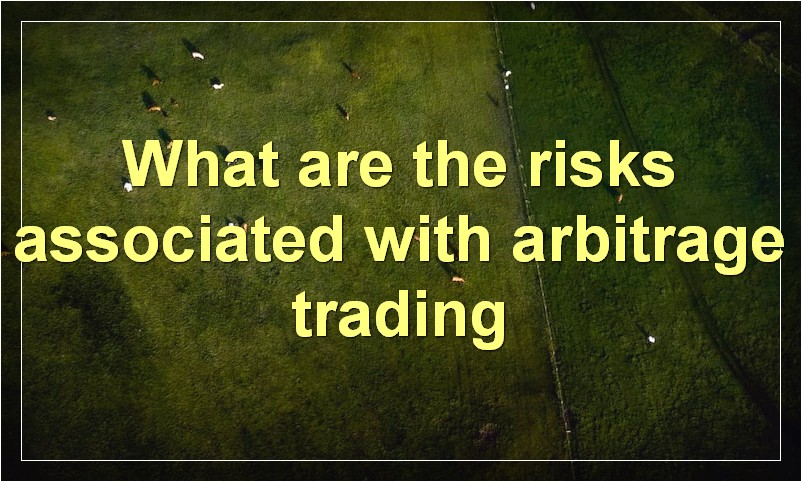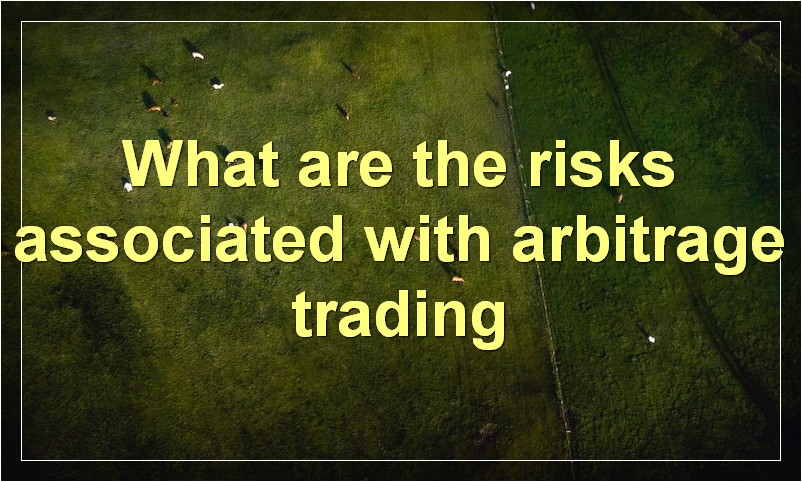If you’re looking to get started in arbitrage trading, this article is for you. We’ll give you a definition of arbitrage trading, discuss the risks and benefits, and provide some strategies for getting started.
What is the definition of arbitrage trading
Arbitrage trading is the simultaneous buying and selling of assets in order to take advantage of price discrepancies in different markets.
It is a type of trading that seeks to profit from the difference in prices of identical or similar financial instruments in different markets or in different forms.
For example, a trader might buy a currency pair at one broker and then sell it immediately at another broker if they spot a discrepancy in prices. If done correctly, arbitrage trading can be a very profitable strategy. However, it can also be a risky proposition if the market moves against the trader.
What are the risks associated with arbitrage trading

Arbitrage trading is the simultaneous buying and selling of assets in order to take advantage of price discrepancies in different markets. For example, if a stock is trading for $10 per share on one exchange and $11 per share on another, a trader could buy the stock on the first exchange and sell it immediately on the second exchange for a profit of $1 per share.
While arbitrage trading can be profitable, it also carries a number of risks. First, prices can change quickly and unexpectedly, which can result in losses. Second, arbitrage trades often require a large amount of capital, which can tie up funds and limit your flexibility. Finally, because arbitrage trades involve buying and selling assets simultaneously, they can be complicated to execute and may require the use of specialized software or services.
What are the benefits of arbitrage trading
Arbitrage trading is the simultaneous buying and selling of assets in order to take advantage of price discrepancies in different markets. This type of trading can be used in order to profit from the difference in prices of identical or similar assets in different markets.
There are several benefits associated with arbitrage trading, including:
1. The ability to generate profits from price discrepancies: Arbitrage trading allows traders to profit from small differences in asset prices in different markets. This type of trading is often used by institutional investors and hedge funds in order to make small but consistent profits.
2. Reduced risk: Arbitrage trading typically involves low levels of risk as trades are executed quickly and there is little exposure to market volatility.
3. Increased market liquidity: Arbitrage trading can help to increase market liquidity as it often results in the buy and sell orders being matched quickly. This can help to reduce spreads and transaction costs.
4. Improved market efficiency: Arbitrage trading helps to ensure that prices in different markets remain close to each other, as traders will buy assets when they are underpriced and sell them when they are overpriced. This can help to improve the overall efficiency of financial markets.
What are the most common strategies used in arbitrage trading
The most common arbitrage trading strategies are:
1. Triangular Arbitrage
2. Statutory Arbitrage
3. Convertible Arbitrage
4. Risk Arbitrage
5. Equity Market Neutral Arbitrage
6. Fixed Income Arbitrage
7. Commodity Arbitrage
How can I get started in arbitrage trading
Arbitrage trading is the simultaneous buying and selling of an asset in order to profit from price discrepancies in different markets. For example, a trader might buy a stock on one exchange and sell it immediately on another exchange for a higher price, profiting from the difference in the two prices.
Arbitrage trading can be a complex and risky strategy, but it can also be a lucrative one. If you’re interested in getting started in arbitrage trading, there are a few things you need to know. First, you need to have a firm understanding of the markets you’re trading in and the assets you’re trading. You also need to have access to capital so that you can take advantage of opportunities when they arise. Finally, you need to be comfortable with taking risks, as arbitrage trading often involves holding positions for short periods of time and making quick decisions.
What are the most important things to know about arbitrage trading

When it comes to arbitrage trading, there are a few key things that you need to know in order to be successful. First and foremost, you need to have a firm understanding of what arbitrage is and how it works. Without this foundation, it will be very difficult to trade successfully.
Another important thing to understand is the different types of arbitrage. There are many different strategies that can be used, and each has its own strengths and weaknesses. You need to carefully consider which type of arbitrage is right for you before you begin trading.
Finally, you need to be aware of the risks involved in arbitrage trading. Like any other form of trading, there is always the potential for loss. However, if you are careful and do your homework, you can minimize these risks and give yourself the best chance for success.
What are some common mistakes made in arbitrage trading
When it comes to arbitrage trading, there are a few common mistakes that traders tend to make. These can be costly mistakes that eat into profits, so it is important to be aware of them.
One common mistake is failing to take into account the spread. The spread is the difference between the bid and ask price of a security, and it needs to be taken into account when calculating potential profits from an arbitrage trade. If the spread is too large, it can eat into any profits that are made.
Another mistake is not factoring in transaction costs. When buying and selling securities, there are always going to be some costs involved. These need to be taken into account when calculating whether an arbitrage trade is likely to be profitable.
Lastly, another common mistake is not having a plan for what to do if the trade does not go as expected. Many times, arbitrage trades will not work out exactly as planned. It is important to have a plan for how to deal with this so that losses can be minimized.
By being aware of these common mistakes, traders can help to ensure that they do not eat into their profits from arbitrage trading.
What are the tax implications of arbitrage trading
Arbitrage trading is the simultaneous buying and selling of assets in order to take advantage of price discrepancies in different markets. For example, a trader might buy a stock in one market and then sell it immediately in another market where the price is higher.
The tax implications of arbitrage trading can be complex, as profits may be considered capital gains or income, depending on the type of asset involved and the length of time it is held. In general, however, arbitrage trading is considered a speculative activity and profits are taxed accordingly.
What are the regulatory requirements for arbitrage trading
Arbitrage trading is the practice of buying and selling assets in order to profit from the price discrepancies between different markets. For example, a trader might buy a stock in one market and then sell it immediately in another market where the price is higher.
In order to engage in arbitrage trading, traders must have a deep understanding of the markets involved as well as the regulatory requirements for each. For example, some markets may have restrictions on how quickly trades can be made, or may require traders to post collateral before making trades.
Understanding the regulatory requirements for arbitrage trading is essential for any trader looking to profit from market discrepancies. failure to comply with regulations can result in heavy fines or even bans from certain markets.
What are the potential rewards and risks of arbitrage trading
Arbitrage trading is the simultaneous buying and selling of assets in order to take advantage of price discrepancies in different markets. The potential rewards of arbitrage trading include profiting from price differences and earning risk-free returns. The potential risks of arbitrage trading include exposure to market risk and liquidity risk.

